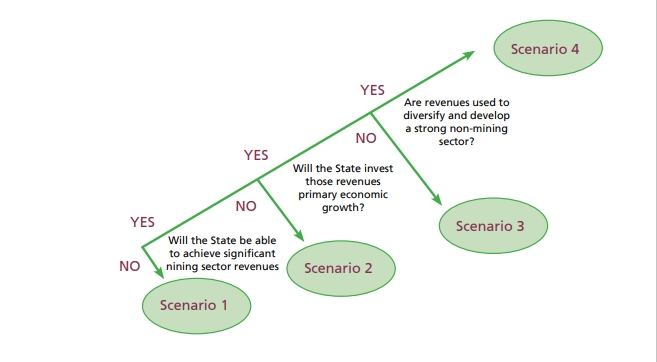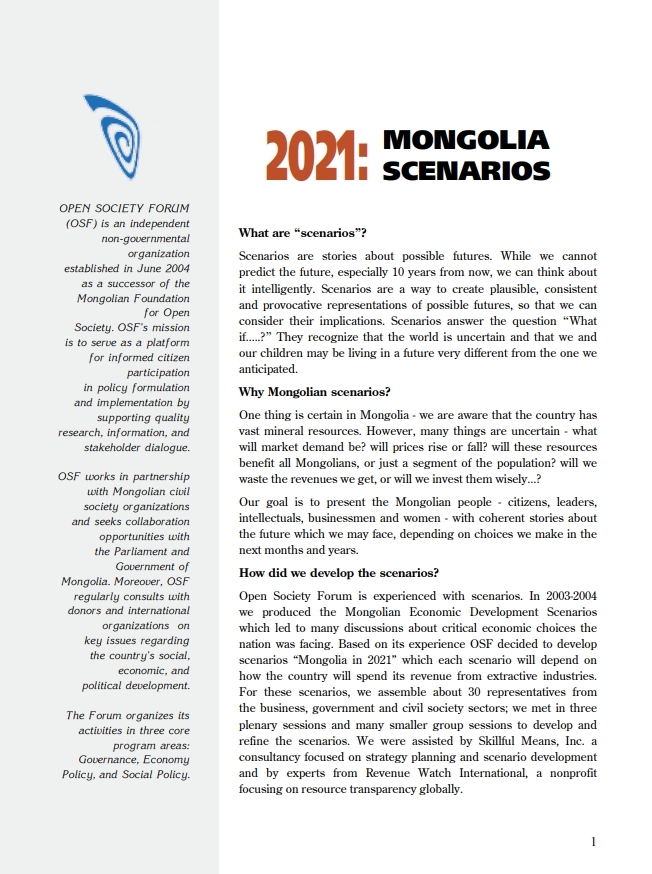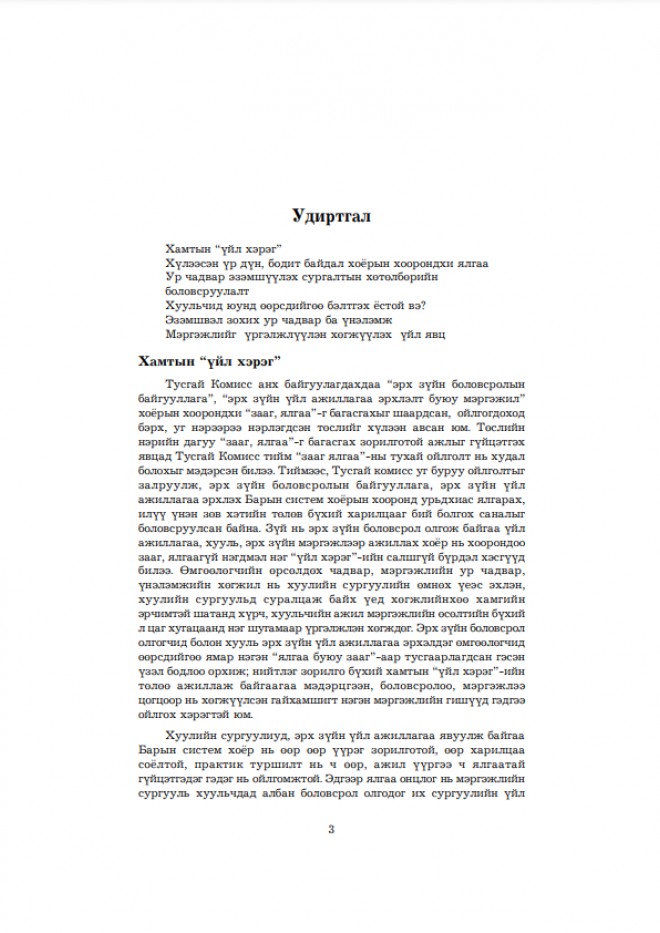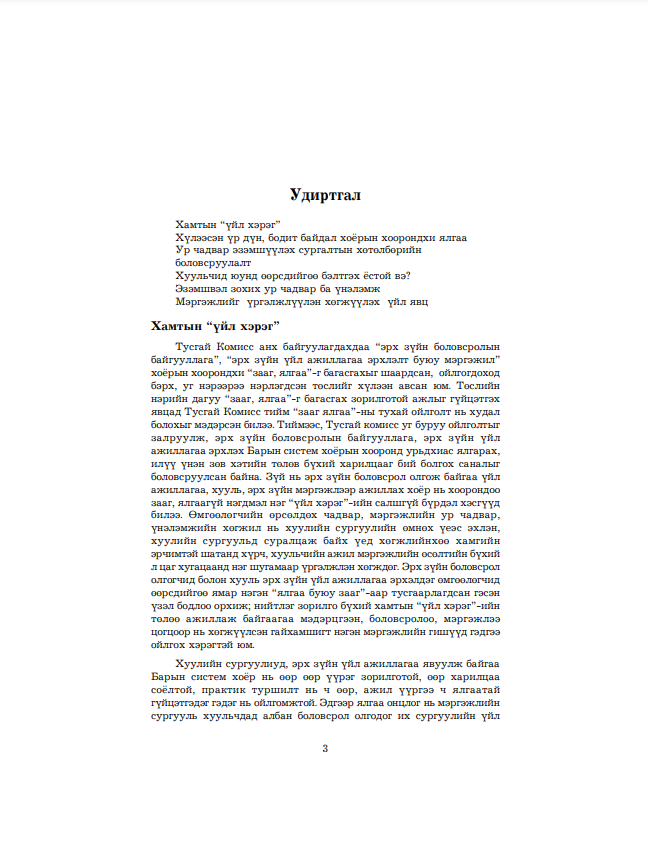Mongolia 2021: Scenarios
What are “scenarios”?
Scenarios are stories about possible futures. While we cannot predict the future, especially 10 years from now, we can think about it intelligently. Scenarios are a way to create plausible, consistent and provocative representations of possible futures, so that we can consider their implications. Scenarios answer the question “What if.....?” They recognize that the world is uncertain and that we and our children may be living in a future very different from the one we anticipated.
Why Mongolian scenarios?
One thing is certain in Mongolia - we are aware that the country has vast mineral resources. However, many things are uncertain - what will market demand be? will prices rise or fall? will these resources benefit all Mongolians, or just a segment of the population? will we waste the revenues we get, or will we invest them wisely...? Our goal is to present the Mongolian people - citizens, leaders, intellectuals, businessmen and women - with coherent stories about the future which we may face, depending on choices we make in the next months and years.
How did we develop the scenarios?
Open Society Forum is experienced with scenarios. In 2003-2004 we produced the Mongolian Economic Development Scenarios which led to many discussions about critical economic choices the nation was facing. Based on its experience OSF decided to develop scenarios “Mongolia in 2021” which each scenario will depend on how the country will spend its revenue from extractive industries. For these scenarios, we assemble about 30 representatives from the business, government and civil society sectors; we met in three plenary sessions and many smaller group sessions to develop and refine the scenarios. We were assisted by Skillful Means, Inc. a consultancy focused on strategy planning and scenario development and by experts from Revenue Watch International, a nonprofit focusing on resource transparency globally.
Scenarios are created from “driving forces”, critical factors which in some cases are relatively certain - population growth, for example - and in other cases are importantly uncertain -developments in neighboring countries, for example. We began by identifying the concerns of Mongolians about the management of our mineral resources and the management of the revenues which we expect. We then looked at various ways of distinguishing the scenarios from each other. We settled on an “axis” and three key questions which might lead to very different futures.

We also agreed on elements that would be addressed in each scenario - inflation, GDP, mining sector revenues, employment, exchange rates, etc. - and the characters—notably Zaya - in our scenario stories. Then we divided into four teams and started writing the scenarios. The scenarios are the story of Zaya and her friends and family, to show what might happen to ordinary Mongolians under each of the scenarios depending on how the country will spend its revenue from mining. In reading the scenarios, it is important to remember several things. Most importantly, the scenarios are not projections or predictions; we are not claiming that the future will in fact unfold precisely or even roughly along these lines. When reading the scenario, we ask that you consider only three questions: is the scenario plausible (might it happen, even if not exactly as the writers suggested)? Is the scenario coherent (does it reflect a sound internal logic)? Is the scenario provocative (does it make you think)?
Хэвлэн нийтэлсэн: Азийн Хөгжлийн Банк
Он: 2003
Файлын төрөл: pdf
Файл: /uploads/site/1126/res_mat/reg_dev_ec_mong.pdf
Түлхүүр үг: Монгол улсын макро эдийн засгийн бодлого, хөдөлмөрийн зах зээл, мөнгө санхүүгийн салбарын хөгжил, гадаад худалдаа, төсвийн бодлого, төсвийн байгууллагын удирдлага санхүүжилтийн тухай хууль, бүсчилсэн хөгжлийн удирдлага зохицуулалтын тухай хууль, орон нутгийн захиргааны бүтэц
Хэвлэн нийтэлсэн: Азийн Хөгжлийн Банк
Он: 2004
Файлын төрөл: pdf
Файл: /uploads/site/1126/res_mat/reg_dev_finalreport_mon.pdf
Түлхүүр үг: бүс нутгийн хөгжил, дэд бүтэц, бүс нутгийн эдийн засаг, техник туслалцаа, эдийн засгийн бодлого
Хэвлэн нийтэлсэн: ADB
Он: 2004
Файлын төрөл: pdf
Файл: /uploads/site/1126/res_mat/reg_dev_finalreport_eng.pdf
Түлхүүр үг: ADB and Mongolia, capacity development, regional development indicator, regional development policy, technical assistance and Mongolia
Монгол, Хятад, Азийн хөгжиж буй орнуудын 2004, 2005 оны эдийн засгийн байдал болон гадаадын хөрөнгө оруулалтын талаарх Азийн Хөгжлийн Банкны мэдээлэл
Хэвлэн нийтэлсэн: Азийн Хөгжлийн Банк
Он: 2004
Файлын төрөл: pdf
Файл: /uploads/site/1126/res_mat/ado_mongol.pdf
Түлхүүр үг: Монгол дахь АХБ-ны үйл ажиллагаа, Монголын эдийн засаг, Хятадын эдийн засаг, хөгжиж буй азийн орнуудын эдийн засаг, Монгол дахь гадаадын хөрөнгө оруулалт
Хэвлэн нийтэлсэн:
Он: 2004
Файлын төрөл: pdf
Файл: /uploads/site/1126/res_mat/migration_mon gen chapter7_mon.pdf
Түлхүүр үг: хүний хөгжил, хүйсийн ялгаатай байдал, шилжих хөдөлгөөн ба хүйсийн ялгаа, дотоод шилжих хөдөлгөөн
Хэвлэн нийтэлсэн: Монголын Хэвлэлийн Хүрээлэн
Он: 2004
Файлын төрөл: pdf
Файл: /uploads/site/1126/res_mat/media_freedom_mong.pdf
Түлхүүр үг: хэвлэл мэдээллийн салбар, хэвлэл мэдээллийн эрх чөлөө, хэвлэлийн эрх чөлөө, хөдөөгийн хэвлэл мэдээлэл, хотын хэвлэл мэдээлэл
Сонгуулийн сурталчилгааны үеийн телевизийн нэвтрүүлгийн мониторинг
Сонгуулийн сурталчилгааны үеийн телевизийн нэвтрүүлгийн мониторинг
Хэвлэн нийтэлсэн: Монголын Хэвлэлийн Хүрээлэн
Он: 2004
Файлын төрөл: pdf
Файл: /uploads/site/1126/res_mat/Son sur_monitoring[1].pdf
Түлхүүр үг: сонгуулийн сурталчилгаа, сонгууль ба хэвлэл мэдээлэл, хэвлэлийн эрх чөлөө, хэвлэл мэдээллийн мониторинг Өмнөтгөл УИХ – ын 2004 оны сонгуультай холбоотойгоор Хэвлэлийн Хүрээлэнгийн Мэдээлэл Судалгааны албанаас Конрад Аденауэрын сантай хамтран Улаанбаатар хотын хэмжээнд “Сонгуулийн сурталчилгаа ба телевиз үзэгчид” олон нийтийн санал асуулга, мөн “Сонгуулийн сурталчилгааны үеийн телевизийн нэвтрүүлгийн мониторинг” сэдэвт уялдаа холбоо бүхий хоёр судалгааг амжилттай хэрэгжүүллээ. Судалгааны гол зорилго нь сонгогчдыг үнэн зөв, тэнцвэрт мэдээллээр шуурхай хангах үүргээ Улаанбаатар хотод нэвтрүүлэг цацаж буй телевизүүд хэрхэн биелүүлж буйг тодорхойлох явдал байлаа. Судалгаа нь нэг талаар сонгуулийн сурталчилгаа телевизээр хэрхэн явагдаж буйд ажиглалт хийж, нөгөө талаар энэхүү сурталчилгаанд үзэгчид хэрхэн хандаж буйг тандан судалсан цогц хэлбэрээрээ шинэлэг юм. Учир нь үзэл бодлын өөр өөр өнцөгөөр харагч сонгогч олныхоо санал бодлыг судлан тодорхойлохын зэрэгцээ телевизийн сурталчилгааны өнгө аясыг өнөөгийн байдалд судлан харьцуулах боломжтой болсноор харилцан бие биеэ хянах, шинжлэх, батлах, үгүйсгэх нөхцөл бүрдсэн. Олон нийтийн санал асуулгын судалгаа, мониторингийн судалгааны тайланг тус, тусд нь бие даасан тайлангийн хэлбэрээр та бүхэндээ толилуулж байна. Ингэснээр уншигч Та судалгааны дүнд өөрийн үнэлгээ, дүгнэлтээ өгч, эргэцүүлнэ хэмээн найдаж байна. Энэ ташрамд уг судалгаануудыг явуулахад санхүүгийн харамгүй тусламж үзүүлэн, монголын хэвлэл мэдээллийн эрх чөлөө, ардчилсан сэтгүүл зүй төлөвшин хөгжихөд ихээхэн хувь нэмэр оруулж буй Конрад Аденауэрын санд талархсанаа илэрхийлье. ТЕЛЕВИЗИЙН СОНГУУЛИЙН СУРТАЛЧИЛГААНЫ МОНИТОРИНГ (судалгааны тайлан) Судалгааны талаар товчхон Хэвлэлийн Хүрээлэнгийн Мэдээлэл судалгааны алба, Конрад Аденауэрын Сангийн санхүүгийн дэмжлэгтэйгээр Улаанбаатар хотод үйл ажиллагаа явуулж буй 5 телевизийн (МҮТВ, UBS, МН25-р суваг, ТВ5, ТВ9) сонгуулийн сурталчилгааны үеийн нэвтрүүлэгт мониторинг хийх төслийг хэрэгжүүлж дууслаа. Судалгааны төслийн зорилго нь 2004 оны Улсын Их Хурлын сонгуулийн сурталчилгааг хэвлэл мэдээллийн хэрэгсэл тэр дундаа ТВ-үүд хэрхэн сурталчлан нэвтрүүлж байна, мөн намуудын тэнцвэрийг хэр хангаж буйд задлан шинжилгээ хийх явдал юм. Ингэснээр ТВ-үүдийн сонгуулийн сурталчилгаанд зарцуулж буй нэвтрүүлгийн цаг, сурталчилгааны төрөл, агуулга, давтамж зэргийг тодруулж сонирхогч байгууллага, хувь хүмүүс, олон нийтийг энэ талын мэдээллээр хангах, анализ хийх боломжийг олгох юм. Барууны хөгжингүй орнуудад ТВ-үүд намуудад зориулсан тусгай цаг, нэвтрүүлэгтэй, намууд нь суваг болгон дээр нэг нэг өөрийн нэвтрүүлэгтэй байдаг аж. Намуудын өөрсдийн бэлтгэж буй нэвтрүүлгийн цаг бусдынхтай тэнцүү байх, сэтгүүлчид нэвтрүүлэг бэлтгэхдээ аль нэг талыг баримтлахгүй байх, хэвлэл мэдээллийн хэрэгсэл намуудын сурталчилгааг тэнцвэртэй ижил түвшинд нэвтрүүлэх зэрэг олон төрлийн шалгуур шаардлагыг хангах ёстой байдаг байна. Тэгвэл эдгээр шалгуур шаардлага манайд хэр хангагдаж буйг дараах тоон үзүүлэлтээс харж болох юм Мониторингоор дараах асуудлуудыг тодруулахыг зорьлоо. Үүнд: 1. Сонгуулийн сурталчилгаанд зарцуулж буй хугацаа /тухайн ТВ-ийн нийт цагт эзлэх хувь/ 2. Судалгааны долоо хоногт аль ТВ-ээр ямар намын сурталчилгаа нийт хэдэн удаа явав. 3. Ямар сурталчилгааг хэзээ нэвтрүүлж байна. /тухайн ТВ-ийн оргил цаг эсэх/ 4. Сурталчилгааны цаана хэн байна вэ? /нам, сэтгүүлч, хэвлэл мэдээллийн байгууллага, хувь хүн/ 5. Сурталчилгааг ТВ-ээр нэвтрүүлэхдээ ямар төрлийг түлхүү ашиглаж байна. /захиалгат, далд, төлбөрт гэх мэт/ 6. Сурталчилгаагаар юун тухай өгүүлж байна. / агуулгаар/ 7. Сурталчилгаанд нэр дэвшигчдийн эзлэх давтамж ямар байна. Хэн хамгийн олон удаа ТВ-ээр сурталчилгаа хийв. 8. Мэдээллийн хөтөлбөр дэх сонгуулийн сурталчилгааны давтамж ямар байна. 9. ТВ-ийн нэвтрүүлэгт эзлэх далд сурталчилгаа СУДАЛГААНЫ АРГАЧЛАЛ Судалгааг сонгуулийн сурталчилгааны дунд үеийн /2004 оны 06 сарын 11-ны Баасан гарагаас 2004 оны 06 сарын 17-ны Пүрэв гараг хүртэл/ нэг долоо хоногийн ТВ-ийн нэвтрүүлгийг сонгон авч явуулав. Ингэхдээ дараах цагийн хуваарийн дагуу ажиллаа. Судалгаанд хамруулсан хугацааг гарагаар харуулбал: Гараг Эхэлсэн цаг Дууссан цаг Үргэлжилсэн хугацаа / өдөрт Даваа 18.00 24.00 6 цаг Мягмар 18.00 24.00 6 цаг Лхагва 18.00 24.00 6 цаг Пүрэв 18.00 24.00 6 цаг Баасан 18.00 24.00 6 цаг Бямба 08.00 24.00 16 цаг Ням 08.00 24.00 16 цаг Нийт цаг 62 цаг Жич: МҮТВ гэхэд 24 цагаас хойш сонгуулийн сурталчилгаа явуулж байсан тул үүнийг алдалгүй бүртгэх, 25-р суваг телевиз Бямба, Ням гарагуудад 12 цагаас эхэлдэг зэргээс шалтгаалан зарим тохиолдолд дээрх хуваарь алдагдах тохиолдол гарч байв. Гэхдээ бусад бүх тохиолдолд дээрх хуваарийг чандлан баримталсан болно. Судалгаанд хамруулсан хугацааг ТВ тус бүрээр тодруулбал: Гараг Үргэлжилсэн хугацаа / өдөрт / дунджаар Үргэлжилсэн хугацаа / 7 хоногт / дунджаар МҮТВ 8.40 цаг 61 цаг UBS 8.50 цаг 62 цаг 25-р суваг ТВ 7.40 цаг 54 цаг TV5 8.50 цаг 62 цаг TV9 8.50 цаг 60 цаг Нийт 41.3 цаг 299 цаг Дээрх хүснэгтэд дурьдсанчлан судалгаанд хамрагдсан телевизүүдийн нэг долоо хоногийн нийт 299 цагийн нэвтрүүлгийг ажиглан тоололт хийсэн болно. Мэргэжлийн 5 судлаач тус бүр нэг нэг ТВ-ийн нэвтрүүлгийг ажиглан мэдээллийг бүрдүүлсэн болно. Судлаачдын нэг долоо хоногийн турш тэмдэглэн бүртгэсэн мэдээллийг нэгтгэн дүгнэж дараах тоо баримтыг гаргалаа. СУДАЛГААНЫ ДҮНГЭЭС 1. Телевизүүдийн сонгуулийн сурталчилгаанд зарцуулсан нийт цаг Телевизүүдийн сонгуулийн сурталчилгаанд зарцуулсан цагийг гаргахдаа тухайн ТВ-ийн нэг долоо хоногийн нийт нэвтрүүлгийн цагт эзлэх хувиар тооцлоо. ¹ Телевиз Ажиглалт хийсэн 7 хоногийн нэвтрүүлгийн нийт цаг (минутаар) Захиалгат болон далд сурталчилгаа хийсэн хугацаа цаг(минутаар) 7 хоногийн нэвтрүүлэгт сурталчилгааны эзлэх хувь 1. МҮТВ 3660 963 26.3% 2. UBS 3720 445 12.0% 3. 25-р суваг ТВ 3240 479 14.8% 4. ТВ5 3720 292 7.8% 5. ТВ9 3600 640 17.8% Нийт 17940 мин 2819 мин 1.1 Сонгуулийн сурталчилгааны давтамж / ТВ тус бүрээр ¹ Телевиз Судалгааны 7 хоногт цацагдсан нийт сурталчилгааны тоо / давтамжаар Улаанбаатарын ТВ-үүдээр явуулсан нийт сурталчилгаанд эзлэх хувь 1. МҮТВ 253 33.1% 2. UBS 60 7.8% 3. 25-р суваг ТВ 166 21.7% 4. ТВ5 127 16.6% 5. ТВ9 159 20.8% Нийт 765 100% Сурталчилгааны давтамжийн хувьд МҮТВ, 25-р суваг ТВ болон ТВ9 телевизээр Улаанбаатар хотын хэмжээнд нэвтэрсэн нийт сурталчилгааны 20-оос дээш хувийг эзэлж байна. Харин UBS телевизийн давтамж бусад ТВ-үүдээс харьцангуй бага байв. 1.2 Сонгуулийн сурталчилгааны давтамж / Нам тус бүрээр ¹ Телевиз Судалгааны 7 хоногт цацагдсан нийт сурталчилгааны тоо Нийт сурталчилгаанд эзлэх хувь 1. Монгол Ардын Хувьсгалт Нам 500 65.4% 2. Эх орон-Ардчилал Эвсэл 214 28.0% 3. Бүгд Найрамдах Нам 2 0.8% 4. Монголын Үндэсний Эв Нэгдлийн Нам 10 1.3% 5. Монголын Либериал Нам 1 0.1% 6. Монголын Уламжлалын Нэгдсэн Нам 15 2.0% 7. Монголын Ногоонтоны Нам 8 0.7% 8. Бие даан нэр дэвшигчид 7 0.9% 9. Бусад (Сонгуулийн Ерөнхий хороо, Сонгогчдын ЭАХХөдөлгөөн гэх мэт) 11 1.4% Нийт 765 100% Судалгааны долоо хоногт гарсан сонгуулийн сурталчилгааны 65.4 хувийг дан ганц МАХН эзэлж байна. Харин Эх-Орон Ардчилал эвслийн сурталчилгаа МАХН-аас хоёр дахин бага, бусад намынх тун бага хувийг эзэлж байв. 1.3 Сонгуулийн сурталчилгааны давтамж / телевиз болон намаар Судалгааны долоо хоногт нэвтрүүлсэн намын сурталчилгааны давтамжийг телевиз тус бүрээр харуулбал: (давтамжаар) Улс төрийн хүчнүүд / нам эвсэл Телевиз МАХН ЭОАЭ БНН МҮЭНН МЛН МУНН МНН Бие даагч МҮТВ 178 40 1 8 1 6 8 3 UBS 49 11 0 0 0 0 0 0 25-р суваг ТВ 33 123 0 0 0 7 0 3 ТВ5 85 38 1 0 0 2 0 1 ТВ9 155 2 0 2 0 0 0 0 Нийт 500 214 2 10 1 15 8 7 Сурталчилгааны давтамжийг ТВ тус бүрээр харвал МАХН болон Эх орон-Ардчилал Эвслийн сурталчилгаа тухайн долоо хоногт жинтэй байр эзэлж байв. МҮТВ, UBS, ТВ5 болон ТВ9-өөр МАХН-ын сурталчилгаа, 25-р суваг ТВ-ээр Эх орон-Ардчилал эвслийн сурталчилгаа дийлэнхдээ явж байв. Бусад намууд болон бие даан нэр дэвшигчдийн сурталчилгааны хувьд МҮЭНН, МУНН-ыг эс тооцвол долоо хоногт нэгээс бага удаа ТВ-ээр сурталчилгаа хийсэн байна. 2. Сурталчилгааг хэзээ нэвтрүүлж байна вэ? / Сурталчилгааны оргил цаг (хувиар) ¹ Цаг МҮТВ UBS МН25-р суваг ТВ5 ТВ9 1. 18 цагаас өмнө 12.3 35.0 0 13.4 0 2. 18.00-18.59 0.8 8.3 4.2 1.6 3.2 3. 19.00-19.59 14.2 6.7 27.7 26.8 28.9 4. 20.00-20.59 38.0 15.0 10.8 7.1 6.9 5. 21.00-21.59 9.0 10.0 30.2 24.4 38.4 6. 22.00-22.59 4.4 18.3 20.5 18.9 5.1 7. 23.00-23.59 5.5 6.7 6.6 7.0 17.6 8. 24 цагаас хойш 15.8 0 0 0.8 0 Хэвлэлийн Хүрээлэнгээс сар тутам явуулдаг “Улаанбаатар хотын Телевиз үзэгчдийн судалгаа”-гаар хүн амын 80 орчим хувь нь 21,00-22,00 цагийг телевиз үзэх хамгийн боломжтой цагаар сонгосон байдаг. Дээрх хүснэгтээс харвал ТВ-ээр гарч буй сонгуулийн сурталчилгааны дийлэнх хувь нь суваг бүрийн оргил цагтай давхацахын зэрэгцээ “мэдээллийн хөтөлбөр”-ийн цагт төвлөрч байв. Тухайлбал: МҮТВ-ийн “Цагийн хүрд” нэвтрүүлэг 20,00-20,30 цагт гардаг. Тэгвэл МҮТВ-ээр гарсан нийт сурталчилгааны 38 хувь нь “Цагийн хүрд” нэвтрүүлгийн үеэр гарсан байна. Мөн 25-р суваг ТВ-ийн нийт сурталчилгааны 30 орчим хувь нь “25 цаг мэдээллийн хөтөлбөр”-ийн үеэр гарчээ. ТВ тус бүрийн сурталчилгааны оргил цагийг графикаар харуулбал 3. Сурталчилгаанд оролцогчид (хувиар) Сурталчилгааны гол оролцогч МҮТВ UBS МН25-р суваг ТВ5 ТВ9 Нэр дэвшигч өөрөө 15.0 53.3 69.3 7.1 27.0 Сэтгүүлч 68.8 75.0 9.0 14.2 93.7 Намын удирдлага 20.9 58.3 1.8 3.1 1.3 Намын гишүүд 6.7 60.0 4.8 3.1 5.7 Урлаг соёлын одод / уран бүтээлчид 8.7 23.3 1.2 3.1 0 Гэр бүлийн гишүүд, найз нөхөд 9.9 28.3 1.8 1.6 0 Дээрх хүснэгтээс харахад нэр дэвшигч өөрөө болон сэтгүүлчид сурталчилгаанд голлох үүрэгтэй байна. Тухайлбал: МҮТВ, UBS, ТВ9, ТВ5-аар ямар нэгэн сурталчилгааг цацахдаа сэтгүүлчид дийлэнх хувийг эзэлж байгаа бол 25-р суваг ТВ-ээр нэр дэвшигч өөрөө сурталчилгаандаа түлхүү оролцсон байна. 4. Сонгуулийн үеийн телевизийн сурталчилгааны төрөл Нам эвсэл холбоод болон нэр дэвшигчид телевизийн сурталчилгааны дараах хэлбэрээр сурталчлуулах нь түгээмэл байна. (хувиар) Сурталчилгааны хэлбэр МҮТВ UBS МН25-р суваг ТВ5 ТВ9 Клип 59.3 23.3 83.2 60.6 34.6 Шууд ярилцлага 0.8 15.0 2.4 2.4 1.3 Захиалгат нэвтрүүлэг 7.5 21.7 7.2 1.6 6.3 Сэтгүүлчийн бэлтгэсэн нэвтрүүлэг 13.5 15.0 1.8 1.6 2.5 Мэдээллийн хөтөлбөр дэх сурталчилгаа 17.4 25.0 5.4 32.3 54.7 СЕХ-оос олгосон хуваарьт нэвтрүүлэг 17.4 --- --- --- --- --- хуваарьт цаг байхгүй Дээрх хүснэгтээс харахад бүх телевизийн хувьд клип сурталчилгааны хэлбэрийн дийлэнх хувийг эзэлж байна. Дараа нь мэдээллийн хөтөлбөрт дэх сурталчилгаа оржээ. 5. Сурталчилгаагаар юун тухай өгүүлж байна / сурталчилгааны агуулга Телевизээр гарч буй намууд / нэр дэвшигчдийн сонгуулийн сурталчилгаа ямар утга агуулга илэрхийлж байсныг тодруулбал: (хувиар) Сурталчилгааны агуулга МҮТВ UBS 25-р суваг ТВ ТВ5 ТВ9 Намын түүхэн замнал 5.5 63.3 1.2 3.9 2.0 Намын онцлог давуу тал 9.5 70.0 12.7 6.3 29.6 Өрсөлдөгч намуудтай харьцуулсан 11.8 36.7 15.7 3.9 3.7 Өрсөлдөгч намуудын алдаа дутагдал 13.1 36.7 15.1 12.6 8.8 Нэр дэвшигчийн хувийн чанар 53.4 86.7 58.4 22.8 21.4 Хийсэн бүтээсэн ажил 37.2 93.3 16.9 32.3 39.0 Цаашид хэрэгжүүлэх мөрийн хөтөлбөр 37.5 91.7 59.6 24.4 8.2 Жич: Олон сонголттой хариулт 6. Сурталчилгаанд нэр дэвшигчдийн эзлэх давтамж ¹ Нэр дэвшигч Тойрог Нам Давтамж МҮТВ UBS МН25 ТВ5 ТВ9 Нийт 1. Чулуунбаатар.Н 62 ЭОАЭ 1 1 2. Галбадрах.Л 12 ЭОАЭ 1 1 3. Галина.Г 59 БД 1 1 4. Дамдинсүрэн.Л 57 БД 1 1 5. Ганхуяг.П 15 ЭОАЭ 1 1 6. Бат-Үүл.Э 34 ЭОАЭ 1 1 7. Дашзэвэг.Н 74 МЛН 1 1 8. Батхүү.Г 25 ЭОАЭ 1 1 9. Баттулга.Х 9 ЭОАЭ 1 1 10. Бат-Хуяг.Ж 18 ЭОАЭ 1 1 11. Адъяа.Ж 20 МАХН 1 1 12. Арвин.Д 49 МАХН 1 1 13. Жаргалсайхан.Б 70 МБНН 1 1 14. Бямбаа.Ч 40 ЭОАЭ 1 1 15. Лүндээжанцан.Д 26 МАХН 1 1 16. Очирхүү.Т 12 МАХН 1 1 17. Одхүү.Д 55 БД 1 1 18. Моломжамц.Д 23 МАХН 1 1 19. Оюун.С 69 ЭОАЭ 1 1 20. Оюунбаатар.Ч 28 МАХН 1 1 21. Сүхбаатар.А 29 МАХН 1 1 22. Сайнбаяр.Ц 59 МЛН 1 1 23. Содномдорж.Н 72 МАХН 1 1 24. Хүрэлбаатар.Ү 73 МУНН 1 1 25. Шаравдорж.Ц 15 МАХН 1 1 26. Цанжид.А 13 МАХН 1 1 27. Шатар.Б 3 МАХН 1 1 28. Туяа.Д 22 МАХН 1 1 29. Цэрэнжав.Л 48 МАХН 1 1 30. Энхсайхан.М 47 ЭОАЭ 1 1 31. Гантөмөр.Л 76 ЭОАЭ 2 2 32. Батбаяр.Батж 65 ЭОАЭ 2 2 33. Бат-Эрдэнэ.Б 50 МАХН 1 1 2 34. Заяа.О 76 МУНН 1 1 2 35. Пүрэвдорж.Л 43 МАХН 2 2 36. Отгонбаяр.С 60 ЭОАЭ 2 2 37. Төмөр-Очир.С 2 МАХН 2 2 38. Энхболд.Н 38 МАХН 2 2 39. Энхтөвшин.Ө 46 МАХН 2 2 40. Баярцогт.С 32 ЭОАЭ 3 3 41. Дэлгэрмаа.Б 61 ЭОАЭ 1 2 3 42. Одончимэд.Л 14 МАХН 3 3 43. Мөнхтуяа.Б 63 ЭОАЭ 2 1 3 44. Сономпил.М 53 ЭОАЭ 1 2 3 45. Улаан.Ч 30 МАХН 2 1 3 46. Хулан.Х 57 ЭОАЭ 1 2 3 47. Ням-Осор.Н 58 МҮЭНН 2 2 4 48. Тэрбишдагва.Д 68 МАХН 3 1 4 49. Батбаяр.Б 70 ЭОАЭ 1 4 5 50. Нямдаваа.П 32 МАХН 5 5 51. Балсандорж.Х 60 МАХН 3 3 6 52. Амаржаргал.Р 64 БД 3 1 4 53. Амарсайхан.Р 58 МАХН 1 1 2 54. Бямбадорж.Ж 66 МАХН 1 2 1 2 6 55. Отгонтөгс.Л 64 ЭОАЭ 3 3 6 56. Хаянхярваа.Д 54 МАХН 6 6 57. Басандорж.Д 40 МНН 7 7 58. Батболд.Б 57 МУНН 2 6 8 59. Цэвээнжав.Д 53 МАХН 8 8 60. Эрдэнэчимэг.Ж 73 МАХН 3 1 4 8 61. Ганзориг.Ч 1 МАХН 10 10 62. Ганхуяг.Д 58 ЭОАЭ 3 7 10 63. Батхишиг.Б 64 МАХН 1 2 5 3 11 64. Сүрэн.О 63 МАХН 12 12 65. Баяртсайхан.Н 61 МАХН 1 6 6 13 66. Ганболд.Э 75 ЭОАЭ 6 3 6 15 67. Эрдэнэ.С 65 ЭОАЭ 16 16 68. Батболд.С 75 МАХН 12 6 5 11 23 57 69. Энхбаяр.Н 65 МАХН 7 7 5 24 43 70. Мөнх-Оргил.Ц 74 МАХН 5 6 2 23 36 71. Батбаатар.Б 66 ЭОАЭ 29 29 72. Алтай.Д 71 МАХН 6 8 2 5 21 73. Батаа.Ц 73 ЭОАЭ 4 1 15 20 74. Дашдорж.Ц 70 МАХН 12 5 1 2 20 75. Болормаа.Н 69 МАХН 8 4 7 1 20 76. Мэдрээ.Б 74 ЭОАЭ 18 18 77. Ганди.Т 57 МАХН 1 4 1 10 17 Жич: МАХН=Монгол Ардын Хувьсгалт нам, ЭОАЭ=Эх Орон Ардчилал эвсэл, МБНН=Монголын Бүгд Найрамдах нам, МУНН=Монголын Уламжлалын Нэгдсэн нам, МЛН=Монголын Либериал нам, МҮЭНН=Монголын Үндэсний Эв Нэгдлийн нам, МНН=Монголын Ногоон нам, БД=Бие даагч 7. Хэн хамгийн олон удаа ТВ-ээр сурталчилгаа цацав 8. Далд сурталчилгаа Сонгуулийн далд сурталчилгааг тоолохын тулд дараах шалгуураар шүүсэн болно. Сурталчилгааны шинж чанартай (сонгуульд оролцож буй улс төрийн хүчин, нэр дэвшигчийн талаар ямар нэгэн үнэлэлт өгсөн, байр суурь илэрхийлсэн, тэнцвэртэй биш, дагнасан мэдээлэл, танилцуулга агуулсан гэх мэт) мөртлөө ямар нэгэн арга хэлбэрээр тодорхой ойлгуулаагүй, хагас дутуу тайлбарласан, нууж хаасан, эргэлзээтэй байгаа бол далд сурталчилгаа гэж бүртгэсэн. Ингэхэд МҮТВ-ийн хувьд нийт сурталчилгааны 19 хувийг, UBS телевизэд 3 хувь, МН 25-р суваг телевизэд 9 хувь, ТВ5 телевизэд 21 хувийг, ТВ9 телевизэд 10 хувийг сонгуулийн далд сурталчилгаа эзэлж байв. Далд сурталчилгааны илрэх гол хэлбэр нь бүх телевизэд мэдээллийн хөтөлбөр байлаа. Энэ үеэр нам хүчин, нэр дэвшигчид өөрсдийн хийсэн бүтээснийг сурталчлах болон сонгуульд өрсөлдөгч нараа өдөөн хатгах, элдвээр хэлэх явдал түгээмэл байсан юм.
Хэвлэн нийтэлсэн: Конрад Аденаурын сан
Он: 2004
Файлын төрөл: pdf
Файл: /uploads/site/1126/res_mat/sudalgaa-election.pdf
Түлхүүр үг: сонгуулийн сурталчилгаа, хэвлэлийн эрх чөлөө, хэвлэл мэдээллийн мониторинг,сонгогч ба нэр дэвшигч
Хэвлэн нийтэлсэн: НҮБ-ын Хөгжлийн хөтөлбөр
Он: 2004
Файлын төрөл: pdf
Файл: /uploads/site/1126/res_mat/urban poverty_mngl1.pdf
Түлхүүр үг: хүний хөгжил Монгол, ядуурал, шилжих хөдөлгөөн, ажил эрхлэлт, эрүүл мэндийн үйлчилгээ, Улаанбаатар хотын хүн ам






